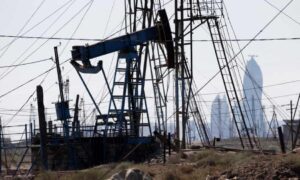
Oil is inescapable in Baku, the capital of Azerbaijan. The smell of it greets the visitor on arrival and from the shores of the Caspian Sea on which the city is built the tankers are eternally visible. Flares from refineries near the centre light up the night sky, and you do not have to travel far to see fields of “nodding donkeys”, small piston pump oil wells about 6 metres (20ft) tall, that look almost festive in their bright red and green livery.
It will be an interesting setting for the gathering of the 29th UN climate conference of the parties, which will take place at the Olympic Stadium in November.
Mukhtar Babayev, the minister of ecology for Azerbaijan, who will chair the fortnight-long Cop climate summit, likes to position the country as at the crossroads of the world. He says it can provide a bridge between the wealthy global north and the poor global south; as a former Soviet bloc country, between east and west; and between its fellow oil and gas producers and the consuming countries that provide its export market.
Azerbaijan is where the world’s first oil wells were dug in the 1840s, more than a decade before the US dug their first well in Pennsylvania. It is one of the most fossil-fuel dependent economies: oil and gas make up 90% of its exports and provide 60% of the government’s budget.
This brought riches. “Oil and, more recently, gas have been largely responsible for the remarkable rise in living standards in Azerbaijan since the late 1990s,” according to the International Energy Agency.
“Azerbaijan would like to share our experience,” Babayev said in an interview in Baku. “We would like to invite all the countries, especially the fossil fuel producing countries, to be together in this process. Because we understand our responsibility. We think that we can do more, and together.”
In December, at the Cop28 summit in Dubai, countries agreed to “transition away” from fossil fuels. For many, that fell too far short of the full phase-out that more than 80 countries were calling for. Yet it was the first time in 30 years of global climate conferences that the causes of the climate crisis – fossil fuels – were identified and targeted. That is a testament to the enormous power fossil fuel producers wield over the rest of the world. In the words of António Guterres, the UN secretary general, they “have humanity by the throat”.
